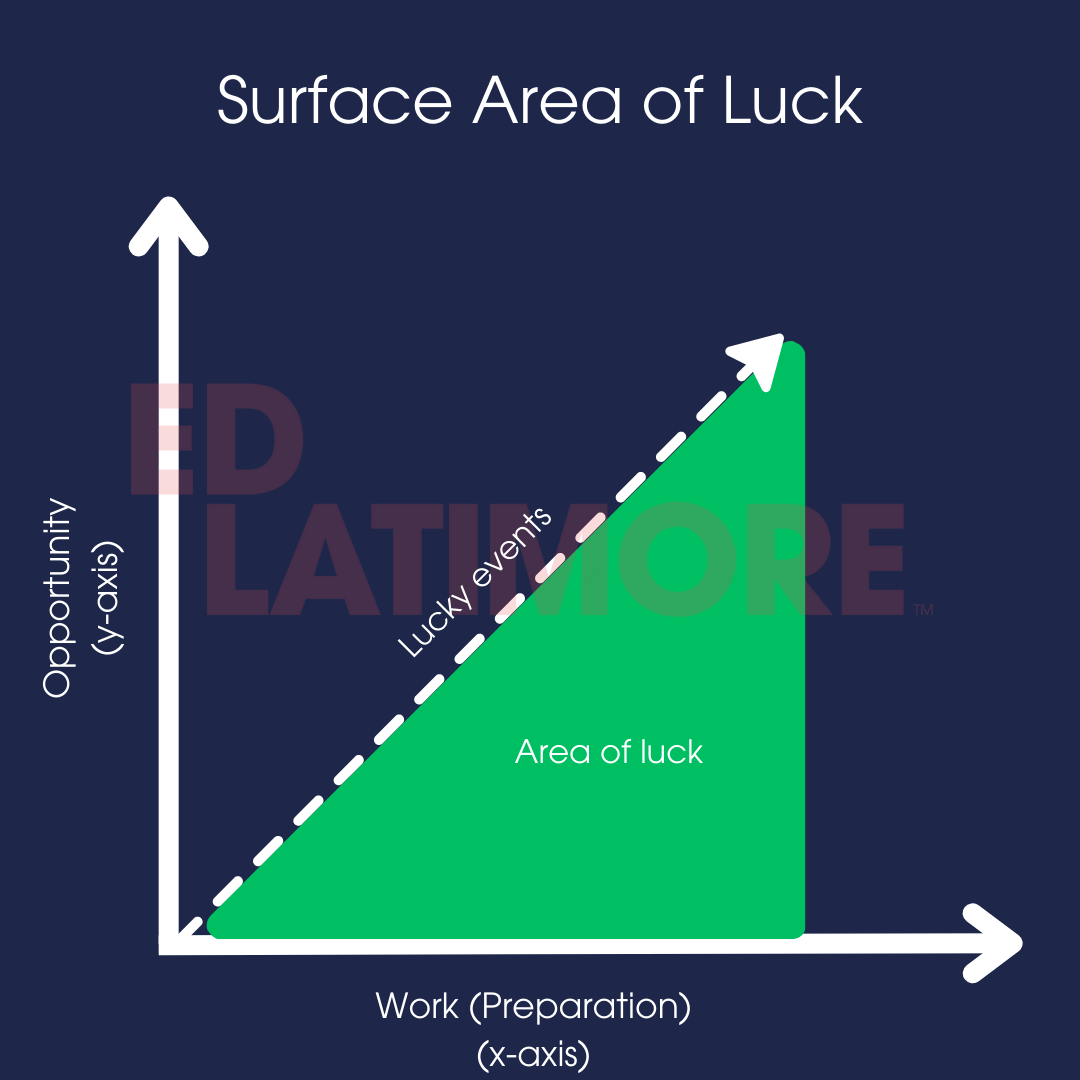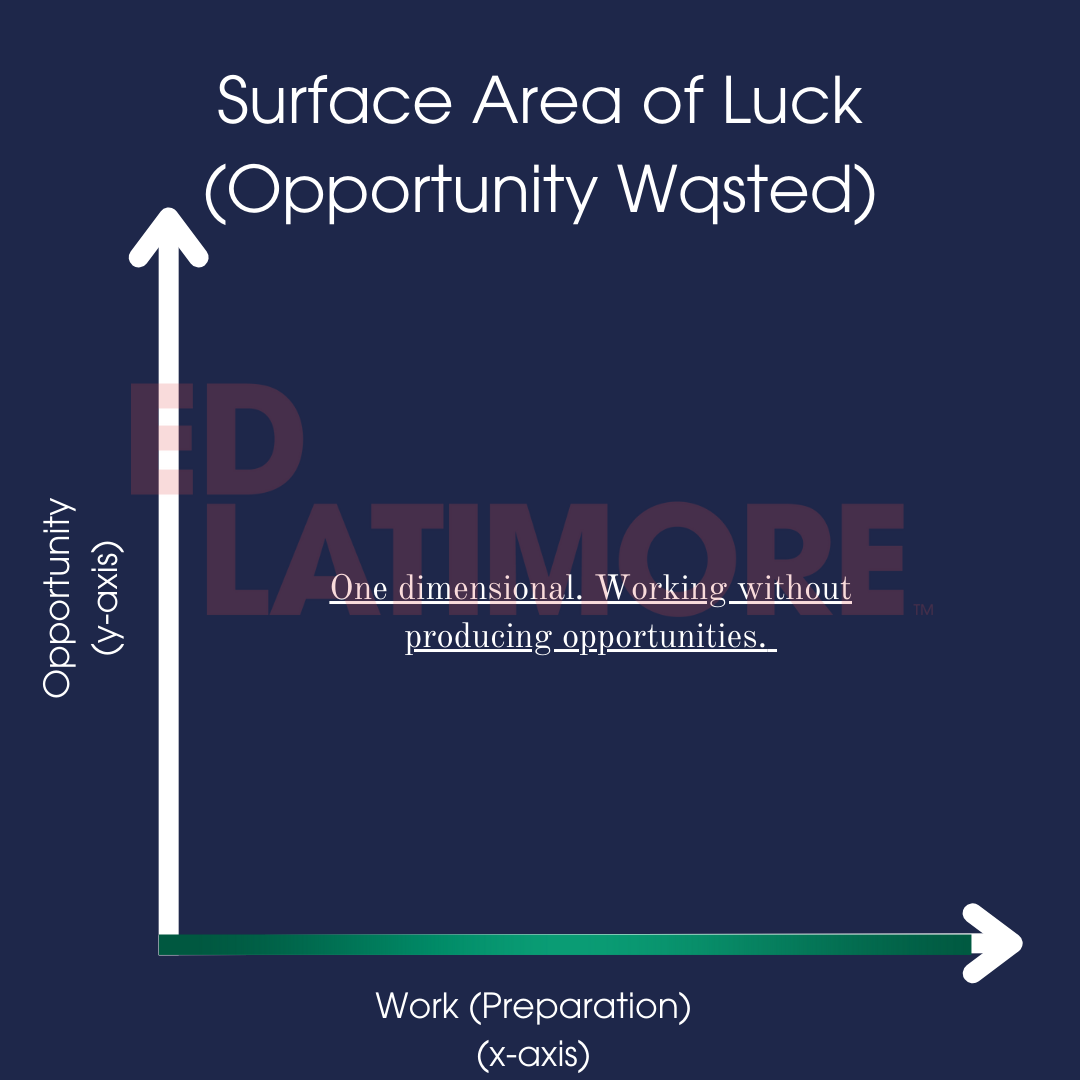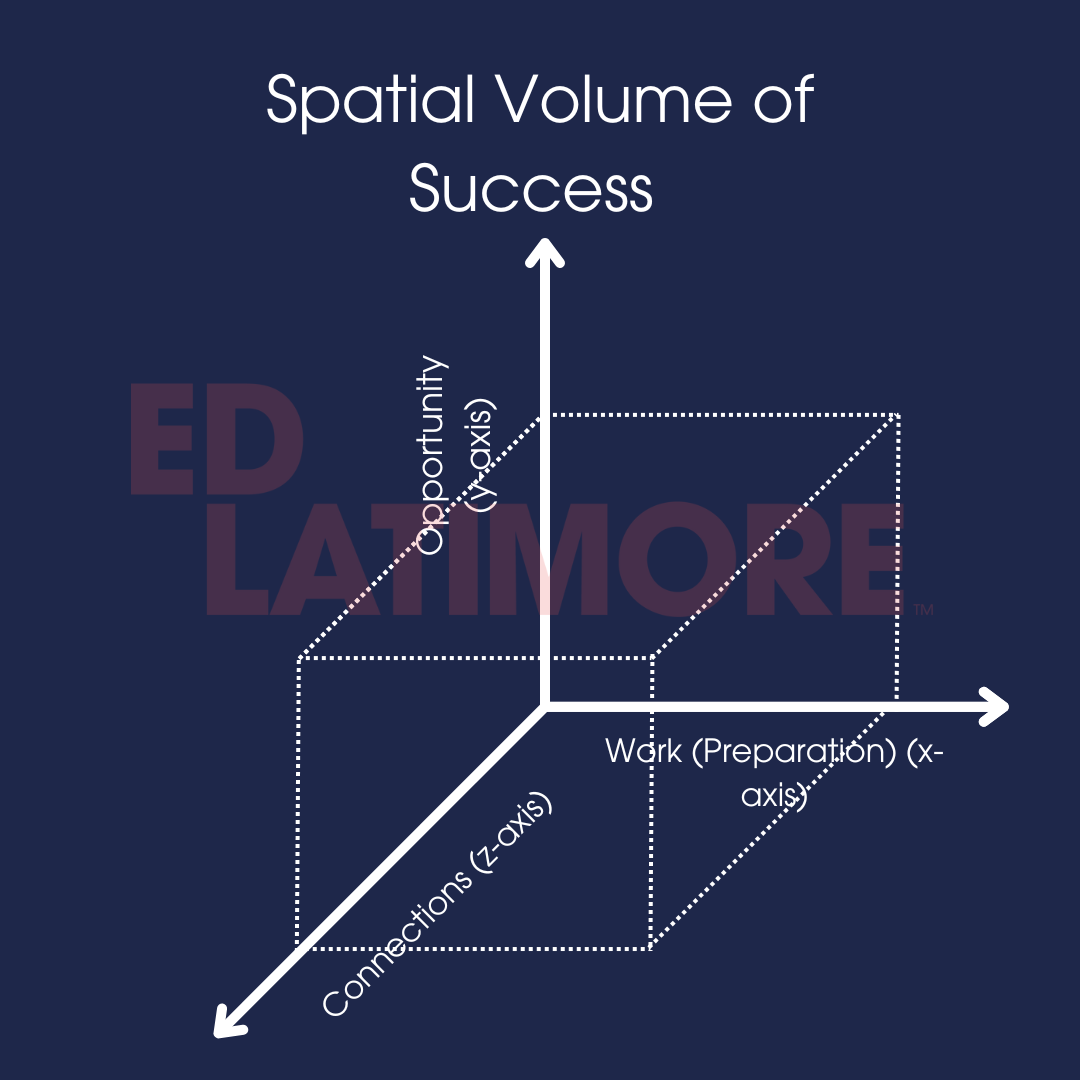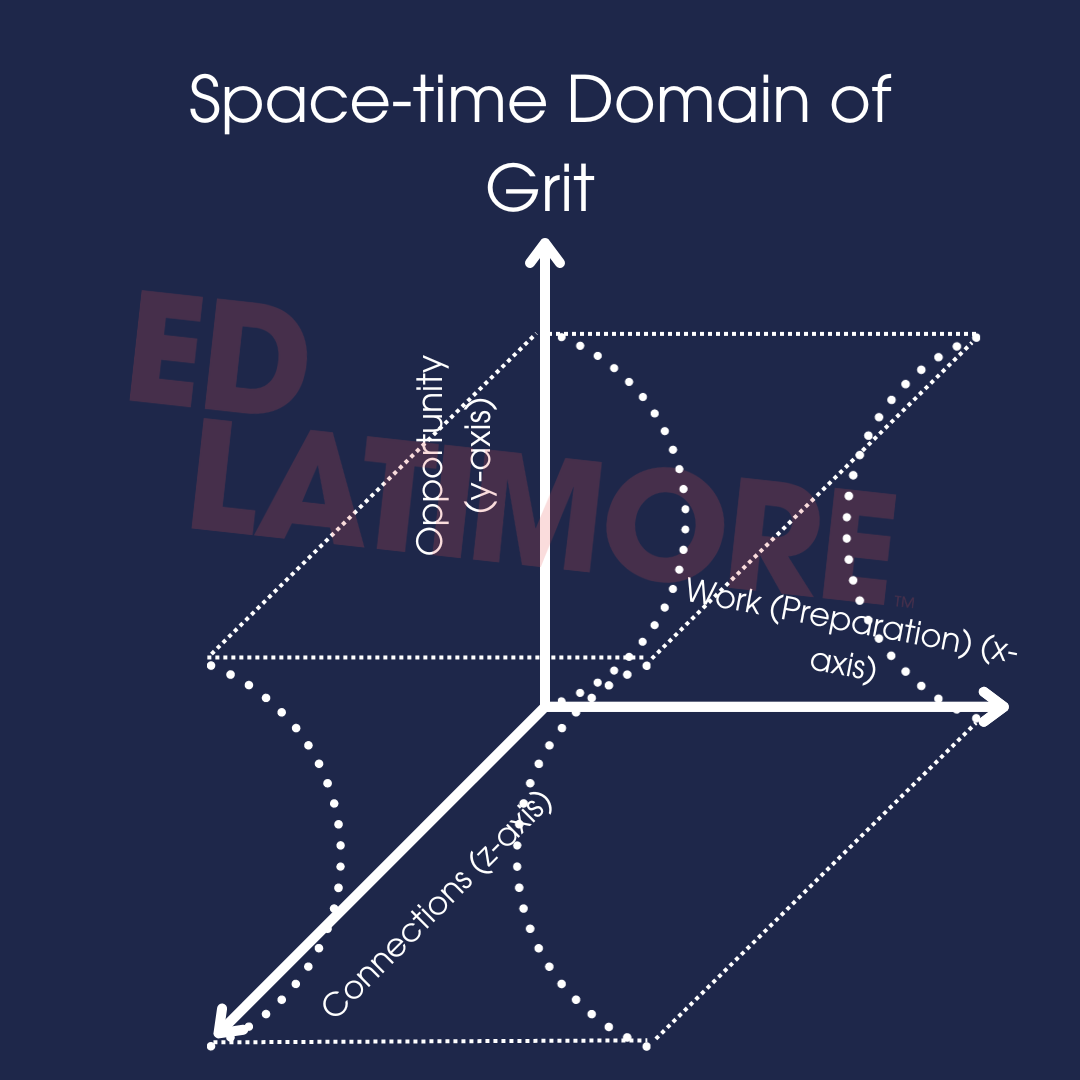The “surface area of luck” refers to the idea that luck can be cultivated by maximizing your chances for positive, random opportunities through broad and diverse life experiences. Taking action expands the playing field where good fortune can take hold.
The idea is that while luck can be thought of as a random chance, you can increase the chances of experiencing a lucky break by maximizing your exposure to potential serendipitous events.
But is there more to luck than this, and if there is, how do we practically implement this idea into lives for better outcomes?
What is “luck”?
Luck plays a significant role in the life of any successful person.
Hard work is important, but a little good fortune goes a long way in being successful.
Everyone’s gotten a lucky break or two, but people don’t like to admit this for two reasons:
- People believe that it takes away from the effort they put in. After all, even people who are OBVIOUSLY lucky don’t like to hear that’s why they have a good life.
- They severely misunderstand what luck is. Most think it’s picking the right numbers or winning the “genetic lottery.” These things help you excel, but they don’t matter
If you reduce all success to “right place, right time,” how can you seriously be considered as a candidate for the power of initiative and hard work? Dealing with the first misunderstanding is a natural result of dealing with the second.
Before I define luck, let me warn you: it will probably differ from whatever’s in Webster’s dictionary. If you’re satisfied with your luck, read theirs instead.
Ed Latimore’s Definition Of Luck: Let “n” be an intended or predicted outcome. Let k be any number of events that occur because of “n.” The unintended n+k order of effects of an action is luck.
Now that we know what luck is, next is the life-changing question: how do we get more of it in our lives?
A brief explanation of the idea of dimensions (You can skip if you are a physics or math person)
Mathematically, a dimension refers to the minimum number of coordinates needed to specify a point in space. It describes the degrees of freedom or ways an object can move. For most conversations, there are only four-dimensional coordinates. These roughly translate into:
- “x” = horizontal
- “y” = vertical
- “z” = depth
- “t” = time
For example:
- A point on a line is fully specified by one coordinate, so a line has one dimension.
- A point on a plane requires two coordinates (e.g. x and y), so a plane has two dimensions. When we measure a flat surface, we only need two coordinates. Colloquially, we just say “length” and “width.”
- A point in everyday space has three coordinates (x, y, z), so regular space has three dimensions. Every object you can touch has a length, width, and height.
- Time is not often discussed as a dimensional quality in everyday conversation, but think of it this way: Your body has its three dimensions, and to accurately describe you, we also mention the time we’re discussing your existence. There’s the current time you read this sentence. Now that you’re reading this next sentence, it’s a little later in time. This is important to ensure your GPS coordinates are accurate or if you ever need to provide an alibi in a court of law.
The dimension of a space refers to the minimum number of coordinates or parameters needed to define a unique point in that space. It describes how many ways there are to move through that space.
Now that we have primer out of the way, let’s start discussing the dimensionality of luck and we can use this idea to increase how much luck we experience in our daily lives.
“The harder I work, the luckier I get.”
I’ve always loved this quote because it reflects my general experience. The better I do, the more good things seem to find me.
This might frustrate “hard workers” who can’t seem to catch a break no matter how many 70-hour work weeks they put in. But let’s look at this dimensionally to explain their frustration.
“Luck is when opportunity meets preparation.”
We’ll consider “preparation” the same as work. They’re effectively the same thing. Let’s plot “work” on the x-axis and “opportunity” on the y-axis. This is important, as opportunity is dependent on work.

Luck is found in the area formed under the intersection of work and opportunity. You can increase this area by doing more work or cultivating more opportunities. I’ll define “work” and “opportunities” more precisely.
“Hard work” is not the same as “valuable work.”
If you’re wondering why your situation never gets better despite working hard, it’s likely because your work isn’t valuable. How can you tell if your work is valuable? Easy: is it scarce?
If you can be easily replaced or outsourced, or there is no barrier to entry for your job, then your work isn’t valuable. It may be grueling and demand 70-80 hours of your week, but if it doesn’t require a particular skill set, knowledge, or set of connections, then it’s not valuable.
Your wages likely reflect that. If you’re ever in doubt, ask yourself this simple question: how quickly could your contribution to a team, company, or organization be replaced if you suddenly disappeared?
Generally speaking, the longer it takes to learn, the higher the barrier of entry, and the fewer people who do it (well), the more valuable it is.
To remember the distinction, keep the following idea in mind:
If I hire you to dig a hole, I’m not paying you more because you used a spoon. Likewise, I’m not paying you less because it turned out to be a sinkhole.
Work and opportunities
In the original post that spawned the idea of the surface area of luck, The programmer Jason Roberts made an astute observation about pursuing your passions:
Your expertise naturally grows when you take action on what deeply interests you. In turn, people learn about your skills and may utilize them in totally unexpected ways.
This is the idea of getting your lucky break. It comes when you take action on valuable work that you enjoy so much you are compelled to push yourself.
This passion gets attention. That attention brings opportunities. When you are good at things that people find valuable, this also bestows on you a sense of competence that bleeds over into other opportunities.
Some of those opportunities will directly relate to the skills that brought you attention. Others will only be tangentially related but prove to be just as life-changing. But the only way to get more opportunities is to become proficient at things people find valuable.
Another way to interpret this is that you must learn to self-promote. Even if you don’t actively market yourself, it’s important that people know that you have talents.
I used to live by the adage, “When you’re good, you tell other people, but when you’re great, other people tell other people about you.”
While this is still mostly true, the world is a noisy place. Markets are not oversaturated as much as crowded with noisy C and D-level players who learned to self-promote to compensate for their lack of skill.
It’s great when those people find you, but it’s even more powerful when you start to seek them out.
What happens when you don’t work?

“You don’t hustle, you don’t eat”—Diddy
If you only do low-value work, you never create opportunities for yourself. Unless you’re born into a successful family, you will almost never just be given an opportunity.
Opportunities find people who are worthy of them. It’s hard to go unnoticed if you do a good job on jobs that are hard to do.
The Spatial Volume of Success
If you did nothing else but become proficient at valuable skills, you’d attract enough attention to manifest tremendous amounts of luck in your life.
However, what if you could take that luck to the next level and start floating through life as if the gods of luck choose to smile at you and only you specifically?
You’ll have to add a third dimension to the system. When you add “connections,” you really start cooking with gas.

Another way to think of this dimension is as “cold outreach.”
Cold outreach is when you’ve got no relationship or connection with the prospect to whom you’re offering your services. These connections must be created and, in doing so, add a new dimension to the surface area of luck, transforming it into the spatial volume of success.
The more progress you’ve made along the dimensions of work and opportunity, the easier it will be to progress along the dimension of connections. Doing valuable work and taking advantage of the opportunities it brings you makes people far more receptive when you reach out to them.
They can more easily verify that you’re someone worth working with by looking at your resume of work, asking around, or looking you up.
Cold outreach works best when you’re already on a hot streak of success
We can think of cold outreach as adding a new dimension to the “surface area of luck” - transforming it into a broader “volume of success.” Making cold connections expands your network beyond existing relationships.
Cold outreach is more effective once you’ve built momentum through great work and capitalizing on opportunities.
People typically think of this as “networking,” but the secret is that there is no such thing as networking. There is only being good at something, letting people discover it, and then offering your services to them.
Stop thinking in terms of building a network. Just get good at something.
— Ed Latimore (@EdLatimore) January 4, 2019
People like hanging around people who aren't losers. It's really that simple.
F--- networking.
A track record of success gives cold outreach more power. Strangers are more open to forming new partnerships if your reputation already speaks for itself. Momentum in other areas smooths the way for expanding your network through cold contact.
“Half of these n$A**s tellin’ lies, they just sound true. Shit, if you had it like that, I woulda found you.” —Young Jeezy, “This one’s for you”
More swings at bat = more home runs
If your batting average is .3, you’ll hit the ball 3 of 10 times that you swing at it. Most of those will be base hits, but occasionally, you’ll knock one out of the park. Let’s assume that your batting average has been maxed out—you simply can’t get any better.
The only way to get more home runs is to swing at more pitches. This takes time, bringing us to the fourth and final dimension.

Success takes time. Many of your attempts will not yield a successful result. However, this does not mean you stop working. All it means is that you have to keep going.
Consistency is king, but it only has power when you can keep it up in the face of failure.
“Success is stumbling from failure to failure with no loss of enthusiasm.”—Winston Churchill
The ability to do this is called “grit.”
It’s grit that separates those who persevere from those who quit. Grit fuels the persistence to pick ourselves up after defeats and disappointments. It provides the tenacity to keep moving forward, even inch by inch when progress seems elusive.
True success goes to those who can stumble repeatedly yet maintain their zeal. Each fall leaves bruises but also offers lessons. With grit, we find the resolve to learn from failures, adjust our approach, and try again.
Don’t miss another issue!
I’m a former heavyweight pro-boxer (13-1-1) and alcoholic (Sobriety date 12/23/13), current writer, and aspiring chess master. I was raised in the projects by a single mom and failed high school, but I eventually earned a bachelor’s degree in Physics.
Follow me X (Twitter), LinkedIn, Youtube, or Instagram. Subscribe below to the Stoic Street Smarts newsletter to never miss an issue.
More Stoic Street Smarts Newsletters!
